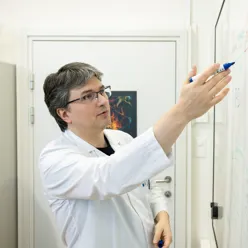The overarching aim of Neuro-SysMed is to develop new therapies and improved treatment strategies. The Centre facilitates early access to these new therapies for patients across Norway through participation in national and international randomised clinical trials. Our ultimate goal is to reduce the burden of disease.
The Centre has established a comprehensive, novel support framework to address the unmet treatment needs of Norwegian patients with these four diseases. By doing so, we enable patients from all over Norway to access cutting-edge treatment trials, and we develop precision medicine. Specifically, Neuro-SysMed continues to work towards:
- discovering novel therapeutic compounds through both in silico and in vitro screening and assessing them in novel disease models
- conducting clinical trials and bringing cutting-edge research to patients
- developing biomarkers for disease detection, patient stratification, treatment response, and precision medicine
- enhancing patient care by improving daily function and quality of life
- introducing systems medicine into Norwegian neurology
Research Plan and Strategy
Neuro-SysMed’s clinical trials are central to its mission, with samples and data from the trials informing the Centre’s translational research activities. Research spans across different groups and expertise, involving large interdisciplinary efforts to achieve its goals.
Neuro-SysMed organises and conducts randomised clinical trials to evaluate the efficacy and safety of therapies, using novel or established drugs with new indications that may delay or halt disease progression, reduce symptoms, or optimise care for affected individuals. While each study has its own scientific questions and efficacy endpoints, all projects contribute data, such as clinical scores, DNA and RNA data, blood and cerebrospinal fluid analyses, tissue sample analyses, and brain images. The collected information can then be used to define biomarkers that enable early and precise diagnosis, stratify patients within each disease, define treatment response, and achieve accurate prognosis and tailored treatment options for individual patients.
In terms of systems medicine, our PD Node is leading the way. The ParkOme project has mapped molecular profiles from tissue samples from more than 1,300 brains of deceased patients with PD and other neurodegenerative diseases, creating the largest brain omics database for PD in the world. From this study, a new subtype of PD has been identified based on mitochondrial deficiency. Work to develop clinical biomarkers is ongoing in all four diseases. Several cell models have been developed specifically for screening and discovering new treatments. Additionally, we are making significant progress in in silico drug screening, utilising national Norwegian registries to enhance our efforts in identifying effective therapies.
